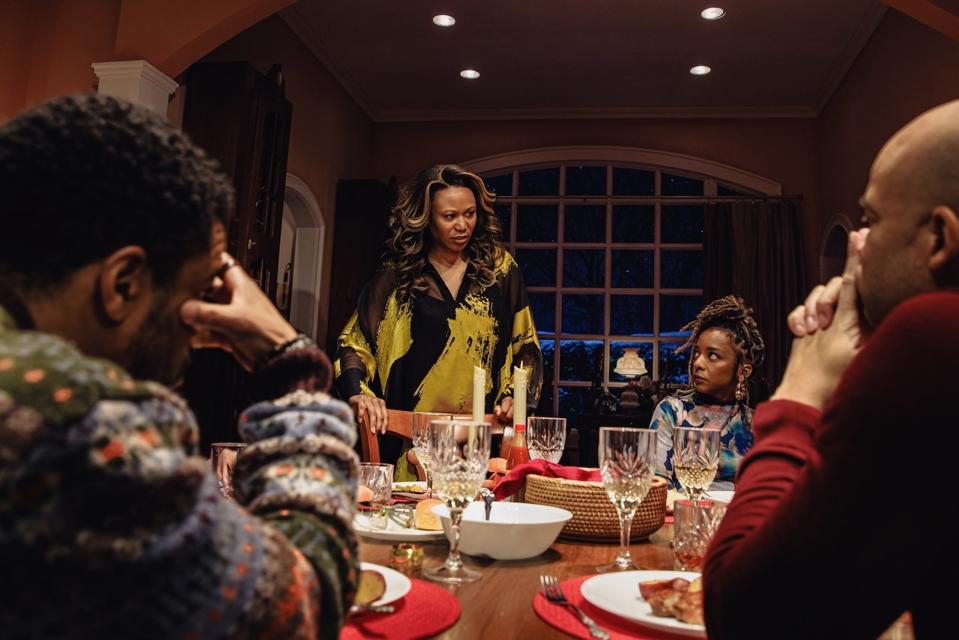Some playwrights are as musical with their words as jazz musicians. Maestros of rhythm and tone, their sharp dialogue is full of surprises. They build, they riff and their silences between the words are just as riveting.
Branden Jacobs-Jenkins is one of those playwrights. A Tony-winner last season for his play Appropriate, Jacobs-Jenkins also was a Pulitzer Prize finalist for his plays Gloria and Everybody. His three-dimensional characters can easily inspire empathy and frustration at the same time. Add to that a ferocious sense of comic timing.
When Alana Arenas heard about his newest play, Purpose, she ached to be part of the world and, as she says, “bask in the miracle” of his writing. Even though the play was just 49 pages at that point, she saw how good it was.
Purpose centers around the influential and revered Jasper family, who were forces in the Civil Rights movement with deep ties to Rev. Martin Luther King Jr. Patriarch and pastor, Solomon Jasper (Harry Lennix) and matriarch/sharp-minded lawyer Claudine (LaTanya Richardson Jackson) worked hard to instill a sense of purpose, faith, and legacy in their two sons, Junior (Glenn Davis) and Naz (Jon Michael Hill).
But this family is seriously fractured with lurking secrets, scandals, and lies. And over and over the sons have failed to live up to the ideals that parents fought for, in quiet and not-so-quiet ways.
Then there’s Junior’s wife, Morgan, who gets embroiled in the drama. She is doing all she can to hold herself, and her family, together. And Naz’s friend (Kara Young) also stumbles into the fray. “The play is a beautiful expression of well-intentioned familial heartbreak,” says Arenas, who originated the role of Morgan at Steppenwolf Theatre Company, which commissioned the Purpose and had its world premiere there last year.
Directed by Phylicia Rashad, Purpose is currently playing on Broadway at the Helen Hayes Theater. And what does Arenas hope that people come away from Purpose after seeing the play? “I read a quote that is attributed to Mother Teresa,” shares Arenas. “It says: “What can you do to create world peace? Go home and love your family.”
Jeryl Brunner: Morgan has tough edges yet you also feel sympathy for her and all she is facing. How are you able to give her that humanity?
Alana Arenas: Morgan is at a point in her life where the many things one could stand to lose have been lost. And that takes away a level of pretense she may have once entertained. Her last efforts to fight for herself and her children require audacity. And the facts of it all are quite disheartening. But if anything can endear her to the audience or any potential allies in the play, I think it would be her tenacity and unwillingness to go down without a fight.
Brunner: What did you love about working with Phylicia Rashad?
Arenas: Ms. Phylicia is truly a servant of the human spirit. She is really after the truth of the work. I find her to be very collaborative and interested in actors’ impulses and then she guides you into a deeper exploration.
Brunner: You have a long history performing with Steppenwolf Theatre Company, where the play made its world premiere with you playing Morgan. Why do you love performing with the company?
Arenas: Steppenwolf feels like family. I am very thankful to call it an artistic home. I have been afforded much growth and development, not just as an artist, but as a human being, because of my relationship with Steppenwolf. And I attribute that to the many incredible artists I have had the pleasure to meet and work with; especially repeated relationships with ensemble members.

